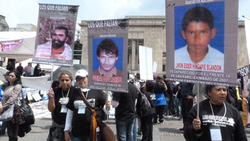November 15, 2014
Colombia’s largest rebel group, Revolutionary Armed Forces of Colombia (FARC), recently acknowledged that its actions have affected citizens in the nearly 50 years of internal conflict. This is the first admission of this kind by FARC. Going further, Farc has stated that its rebels are ready to take responsibility for their actions during the 50 years of conflict in Colombia.
FARC joined negotiations in Cuba with the Colombian government in November 2013. The purpose of the talks has been to get FARC to sign an agreement in which it renounces its armed struggle in order to join the legal political process and stop the internal conflict, and to provide for victim reparations. However, as a part of working towards an agreement on disarmament and the eventual implementation of a peace deal, FARC is expected to seek an amnesty agreement.

Photo Credit: CM Keiner/Flickr, at http://abcnews.go.com/ABC_Univision/News/farc-victims-seek-truth-peace-talks/story?id=17593438
Several important questions emerge from FARC’s admission. First, what type of reparations are appropriate, when family members are still searching for over 400 victims who were kidnapped by FARC and went missing between 2002 and 2011? Second, should FARC members receive amnesty, or is that in conflict with the notion of FARC taking responsibility for their role in the violence?
In order to determine what type of victim reparations are appropriate, it is important to understand the nature of the conflict. The conflict in Colombia has claimed around 250,000 lives and displaced over 5 million people. The majority of killings were carried out by the Colombian army, police, and state-linked right-wing paramilitary groups, including FARC.
Between 2002 and 2011, it is alleged that rebels kidnapped 2,678 civilians, and that more than 400 of these victims are still in captivity or have gone missing. Members of victims’ associations such as Los Que Faltan, or “Those Who are Missing,” state that they are not opposed to the peace process, and support it, as long as there is transparency with what has happened to the victims. Other victims rights groups have stated that they do not want peace talks to advance unless FARC is willing to provide answers to the families of those victims that have been kidnapped or disappeared. During the peace talks, FARC commanders have stated that the rebels no longer hold any captives. This leaves family members of missing victims with little in the way of hope of finding their loved ones. Farc has also threatened throughout this process that without government concessions, peace talks will fail. The group states that unless the government is willing to guarantee the rights and security of the opposition and cease killing guerrilla commanders in the field, the peace talks will not succeed. Thus, FARC has provided few answers to the families of victims, and has only demonstrated willingness to take responsibility to the extent that members receive amnesty for their actions.
Parties involved in the talks have argued that in order to truly find a solution, it must address the roots of conflict. Integral in this process would be acknowledgement of the violence caused by FARC, for FARC to provide answers to the many families with missing family members and little in the way of answers. It is unlikely that the peace process will be successful, or that victims and their families will accept any sort of reparations without getting the answers that they are looking for. It remains to be seen whether FARC’s admissions and willingness to take responsibility will include providing victims and their families with meaningful reparations and the answers they have been searching for.
With regard to the issue of amnesty, the same perpetrators that have been responsible for large-scale human rights abuses, which have continued and in some cases increased despite the peace process, are now seeking integration into the Colombian political process. Providing amnesty to these perpetrators of violence and integrating them into the legal and political process would send the wrong message to victims, delay the peace process, and could potentially result in violence. When FARC last attempted to take part in electoral politics, several thousand members and elected officials were murdered. Even if FARC agrees to victim reparations, it is unlikely that the integration of these perpetrators into the political process will be welcomed by victims and their families, and even less likely that they will support the continuation of peace talks.
The question remains what recourse victims will have if FARC opts not to provide victims and their families with the information they are seeking regarding the whereabouts of missing persons. FARC negotiator Jesus Santrich stated that any punitive measures would have to be taken by an independent tribunal, not the state or its “corrupt and venal judiciary.” If the Colombian government agrees to amnesty or refuses to prosecute for crimes committed by FARC member over the 50 years of violence, members of the international community may call for an independent tribunal to investigate crimes committed by FARC members.
Emily Boehme is a 2L law student at the University of Denver Sturm College of Law and a Staff Editor for the Denver Journal of International Law and Policy.

